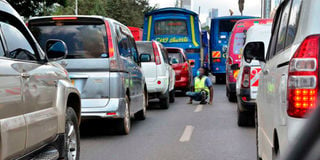Premium
Bill targets ‘lords’ of beggars with disabilities

A beggar crawls in-between traffic along Uhuru Highway, Nairobi on March 23, 2021. Individuals who cause, procure, or encourage a child or an adult with disabilities to engage in begging, face a Sh2 million fine or two years in jail after Parliament approved a new Bill for enactment into law.
What you need to know:
- The Bill gives persons with disabilities the right to recover damages in any court for being denied admission into any premises or providing any service or amenity.
- “Without prejudice to subsection (3), damages awarded under that subsection shall be recoverable summarily as a civil debt,” section 74 (4) of the Bill states.
Individuals who cause, procure, or encourage a child or an adult with disabilities to engage in begging, face a Sh2 million fine or two years in jail after Parliament approved a new Bill for enactment into law.
The National Assembly passed the Persons with Disabilities Bill, Senate Bill No. 7 of 2023, which seeks to align Kenya’s laws with Article 54 of the Constitution, enhancing the rights and opportunities for persons living with disabilities.
During a special session last Thursday, the MPs approved amendments sponsored by the Committee on Social Protection to strengthen the penalties to be meted out to those who take advantage of persons living with disabilities.
“A person who causes, procures, encourages or solicits a child or an adult with disabilities to engage in begging or receiving alms commits an offense and shall be liable on conviction to a fine not exceeding two million shillings or imprisonment for a term not exceeding two years, or to both,” a new clause in the Bill, which now awaits President William Ruto’s signature to become law, reads.
The Bill enhances penalties for those who voluntarily or knowingly commit or abet the degrading treatment of persons with disabilities by words, either spoken or written or signs to Sh1 million.
The Bill had originally proposed a fine of Sh200,000 or imprisonment for a term not exceeding one year to a person who voluntarily or knowingly commits or abets the degrading treatment of a person with a disability.
“That, clause 66 of the Bill be amended by deleting the words “two hundred thousand shillings” and substituting, therefore, the words “one million shillings,” the new changes to the Bill, state.
The Bill slaps a Sh2 million fine or one year in prison to medical practitioners who neglect persons living with disabilities.
It prohibits health professionals from discriminating against persons living with disabilities in the observance of ethical guidelines on informed consent and confidentiality while providing healthcare and other services to persons with disabilities.
“Any person who performs, conducts or directs any medical procedure to be performed on a person with disability, which leads to or is likely to lead to infertility commits an offence and is liable upon conviction to a fine of Sh3 million or to imprisonment for a term not exceeding one year or to both,” the Bill states.
“Any person acting as a caregiver of a person with a disability, whether as a parent or guardian or in any other capacity, who does any act to facilitate, or negligently fails to prevent such medical procedure from being performed, commits an offence and is liable on conviction to a fine not exceeding Sh500,000 or to imprisonment for a term not exceeding one year or to both.”
The Bill also places responsibility on registered owners of public service vehicles to adjust their cars to suit persons with disabilities.
“A registered owner of a public transport vehicle who improves or modifies it to make it accessible to persons with disabilities shall be entitled to apply to the Cabinet Secretary responsible for finance for twenty-five percent of the direct cost of improvement or modifications,” the Bill states.
The Bill prohibits individuals from denying a person with disabilities admission into any premises to which members of the public are ordinarily admitted.
The Bill gives persons with disabilities the right to recover damages in any court for being denied admission into any premises or providing any service or amenity.
“Without prejudice to subsection (3), damages awarded under that subsection shall be recoverable summarily as a civil debt,” section 74 (4) of the Bill states.
The Bill seeks to promote inclusivity and safeguard the welfare of vulnerable groups.





